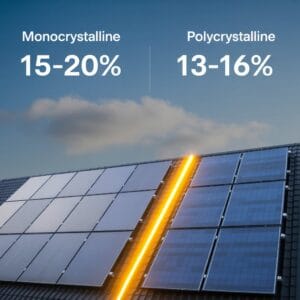Pakistan, like many developing countries, faces a significant challenge in meeting its growing energy demands. The country heavily relies on fossil fuels, which not only contribute to environmental pollution but also pose a threat to energy security. However, there is a viable solution that can address these issues which is solar panels. In this article, we will explore how solar panels can serve as an alternative power source for Pakistan, focusing on the benefits of solar energy, the role of inverters, and the concept of net metering.
Harnessing the Power of the Sun
Solar panels are devices that convert sunlight into electricity. They consist of photovoltaic cells that absorb sunlight and generate direct current (DC) electricity. This DC electricity is then converted into alternating current (AC) electricity through an inverter, making it suitable for use in homes, businesses, and industries.
One of the key advantages of solar panels is their ability to harness solar energy, a clean and renewable source of power. Pakistan is blessed with abundant sunlight throughout the year, making it an ideal location for solar energy generation. By utilizing solar panels, Pakistan can reduce its dependence on fossil fuels and significantly decrease carbon emissions, contributing to a greener and more sustainable future.
The Role of Inverters in Solar Power Systems
Inverters play a crucial role in solar power systems. They convert the DC electricity generated by solar panels into AC electricity, which is compatible with the existing electrical grid. Inverters ensure that the electricity produced by solar panels can be used to power appliances, lighting, and other electrical devices in homes and businesses.
In addition to converting electricity, inverters also provide important monitoring and control functions. They track the performance of solar panels, optimize power output, and protect the system from voltage fluctuations and other electrical issues. With advancements in technology, modern inverters are more efficient and reliable, ensuring maximum utilization of solar energy.
A Cost-Effective Solution
One of the significant advantages of solar panels is their cost-effectiveness. While the initial investment may seem high, solar panels have a long lifespan and require minimal maintenance. Once installed, solar panels can generate electricity for decades, significantly reducing electricity bills and providing a reliable source of power.
Moreover, solar energy is a free resource. By harnessing the power of the sun, Pakistan can reduce its reliance on expensive imported fossil fuels, saving valuable foreign exchange. The government can also incentivize the adoption of solar panels through subsidies and tax benefits, making it an attractive option for individuals and businesses.
Empowering Consumers with Net Metering
Net metering is a policy that allows consumers to sell excess electricity generated by their solar panels back to the grid. Under this system, the electricity meter runs backward when the solar panels produce more electricity than is being consumed. This enables consumers to offset their electricity bills and even earn credits for the surplus energy they generate.
Net metering not only benefits individual consumers but also contributes to the overall stability of the electrical grid. By integrating solar panels into the grid, Pakistan can reduce peak demand, minimize transmission losses, and enhance grid resilience. This decentralized approach to energy generation empowers consumers and promotes a more sustainable and reliable energy system.
Conclusion
Solar panels offer a promising solution to Pakistan’s energy challenges. By harnessing the power of the sun, solar energy can provide a clean, renewable, and cost-effective alternative to fossil fuels. Inverters play a crucial role in converting solar energy into usable electricity, while net metering empowers consumers to actively participate in the energy transition.
To fully realize the potential of solar panels, Pakistan needs to invest in infrastructure, promote research and development, and create favorable policies and incentives. By embracing solar energy, Pakistan can not only address its energy needs but also contribute to global efforts in combating climate change. The time is ripe for Pakistan to embrace solar panels as an alternative power source and pave the way for a sustainable future.



